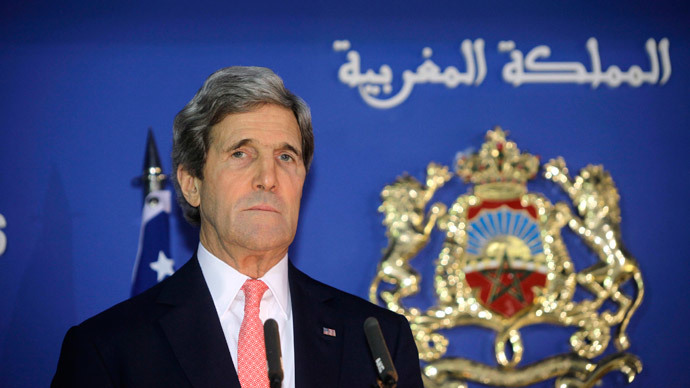Kerry gives up on Israeli-Palestinian peace talks

Secretary of State John Kerry said Friday that the Obama administration will reassess its role in attempting to broker a peace deal between Israel and Palestine after the latest round of discussions proved to be all but fruitful.
Speaking to reporters from Rabat, Morocco amid his latest tour overseas, Kerry said that the most recent attempts from the United States to find common ground between leadership in the Middle East have failed.
Reporting from Morocco, the Associated Press said Kerry appeared “visibly downbeat” as he disclosed to journalists the results of the State Department’s latest attempt to find an answer to the long-standing issues between the Israelis and Palestinians.
Both sides said last year that they’d reach an agreement by the end of April 2014, but Sec. Kerry said this week that a negotiation between parties is nowhere as near as the White House had hoped. Israel had initially agreed to release a group of Palestinian prisoners, but earlier this week rescinded that promise, prompting discussions to deteriorate even further. Palestinian President Mahmoud Abbas responded on Tuesday by saying his nation would seek greater recognition from the United Nations, much to the chagrin of Israeli Prime Minister Benjamin Netanyahu.
"They say they want to continue,” the AP quoted Kerry as saying of both leaders. "But we are not going to sit there indefinitely. This is not an open-ended effort. It's reality check time."
“Israel has a habit of evading agreements and conventions it has signed,” senior Palestinian official Yasser Abed Rabbo added to Agence France-Press this week. “That is why conditions for future negotiations must change radically.”
But Israeli leadership — namely Justice Minister Tzipi Livni — now say that Palestine has soured the odds of an agreement by appealing to the UN. Palestine “has breached its obligations by applying to the United Nations” Livni said Wednesday, and that “if they want a state, they need to understand that it will only be established on the negotiating table.”
According to AP, Kerry suggested to journalists that there had been a virtual collapse in efforts to negotiate as of late, and his remarks were his “most pessimistic assessment of the situation” since this round of talks started last summer.
"It is regrettable that in the last few days both sides have taken steps that are not helpful and that's evident to everybody," Kerry told reporters.
“You can facilitate, you can push, you can nudge, but the parties themselves have to make fundamental decisions and compromises,” he said. “The leaders have to lead and they have to be able to see a moment when it’s there.”
According to the AP, Kerry will soon return to the US to see how President Barack Obama and the rest of the players involved in his administration overseas efforts will wish to proceed.
"Clearly we have an enormous amount on the plate," Kerry said. At the same time, however, he added that "There are limits to the amount of time and effort that the United States can spend if the parties themselves are unable to take constructive steps.”
“We are going to evaluate very carefully exactly where this is and where it might possibly be able to go,” he said of the talks.
In the meantime, though, the US is indeed embroiled to at least some degree in a handful of other foreign affairs, and Kerry specifically singled conflicts in Ukraine and Syria, as well as ongoing efforts involving Iran’s nuclear program.













